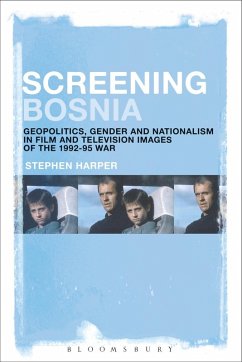The Bosnian war of 1992-1995 was one of the most brutal conflicts to have erupted since the end of the Second World War. But although the war occurred in 'Europe's backyard' and received significant media coverage in the West, relatively little scholarly attention has been devoted to cultural representations of the conflict. Stephen Harper analyses how the war has been depicted in global cinema and television over the past quarter of a century. Focusing on the representation of some of the war's major themes, including humanitarian intervention, the roles of NATO and the UN, genocide, rape and ethnic cleansing, Harper explores the role of popular media culture in reflecting, reinforcing -- and sometimes contesting -- nationalist ideologies.
Bitte wählen Sie Ihr Anliegen aus.
Rechnungen
Retourenschein anfordern
Bestellstatus
Storno









